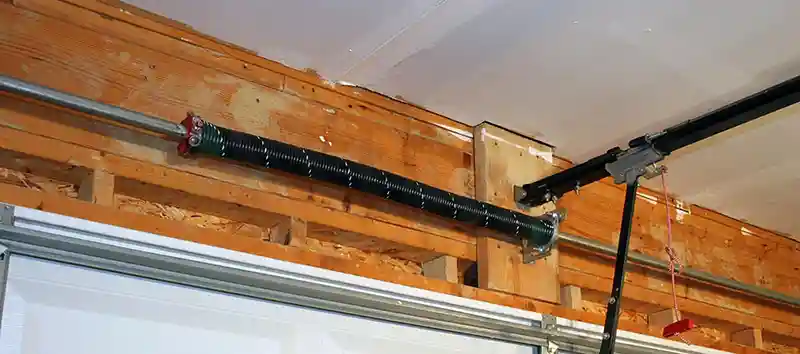Garage door springs are probably the most important component of a garage door system. For example, the springs provide extra force to help open and close the heavy garage doors. In addition, they reduce the amount of energy your garage door opener needs to lift and lower the door. As a result, it’s not surprising that springs are the most common component to break. Here are the top 3 reasons garage door springs break:
1) Old Age
 Standard torsion springs last for around 10000 cycles with a cycle being one open and close of the door. For instance, when you open and close the door to get your car out, that’s one cycle. Likewise, if you open the door to get your lawnmower out, that’s another cycle. One car going in an out of the garage daily adds up to 730 cycle per year so cycles can add up fast. In short, with average usage, homeowners can expect around 7 years of service from their garage door springs.
Standard torsion springs last for around 10000 cycles with a cycle being one open and close of the door. For instance, when you open and close the door to get your car out, that’s one cycle. Likewise, if you open the door to get your lawnmower out, that’s another cycle. One car going in an out of the garage daily adds up to 730 cycle per year so cycles can add up fast. In short, with average usage, homeowners can expect around 7 years of service from their garage door springs.
How Garage Door Springs Work
Standard garage door springs are made of heavy gauge steel wire coiled up as a spring. When the spring is installed, your garage door pro manually winds the spring so there is some stored force in the spring when the door is closed. In other words, the garage door spring wants to unwind by lifting the door. As a result, the weight of the door and the force in the spring counter each other. This is how you are able to lift a door that weighs over 100 pounds without too much effort – the spring is providing extra muscle. As you lift the door, the spring unwinds reducing the amount of force applied which is alright since the weight of the door is being transferred to the horizontal tracks. Check out this video for a good explanation.
The key here is that the spring spends its life winding and unwinding. If you’ve ever twisted a wire coat hanger, you know that eventually the metal wire breaks. That’s because the metal gets fatigued and loses strength over time so it’s natural for the springs to wear out and break.
Garage door springs are classified by cycle ratings and reflect the construction of the spring. Heavy duty springs are made of stronger materials so they last longer. No matter what type of spring you install, eventually, garage door springs break.
2) Rust and Corrosion
Garage door springs are prone to rust like with most metals and this can impact the life of the spring. Rust or corrosion cause additional friction when the spring winds and unwinds. As a result, the spring metal will fatigue sooner. In addition, rust reduces the integrity of the metal causing premature wear. The impact of rust will vary depending on your location. For instance, areas that enjoy a winter with salted roads can expect more rust because of the salt in the air. You can reduce the impact of rust by spraying your springs with lithium grease or silicone spray 2 or 3 times a year.
3) Lack of Maintenance
You should make it a habit to lubricate your spring as described above. In addition to lubrication, garage doors should be checked for balance on a regular basis. We mentioned that the garage door spring acts as a counterbalance above. If your door is not balanced, it could be a sign of pending failure and may be time to call for service. We routinely check garage door balance as part of any maintenance call.
To check your garage door balance, simply pull the release cord to put the door in manual mode. Then, lift the door about halfway and let go. The doors should remain at that level however, if it falls down or sags, then your springs may be failing. We would advise calling for service so you can get it replaced at a convenient time.
